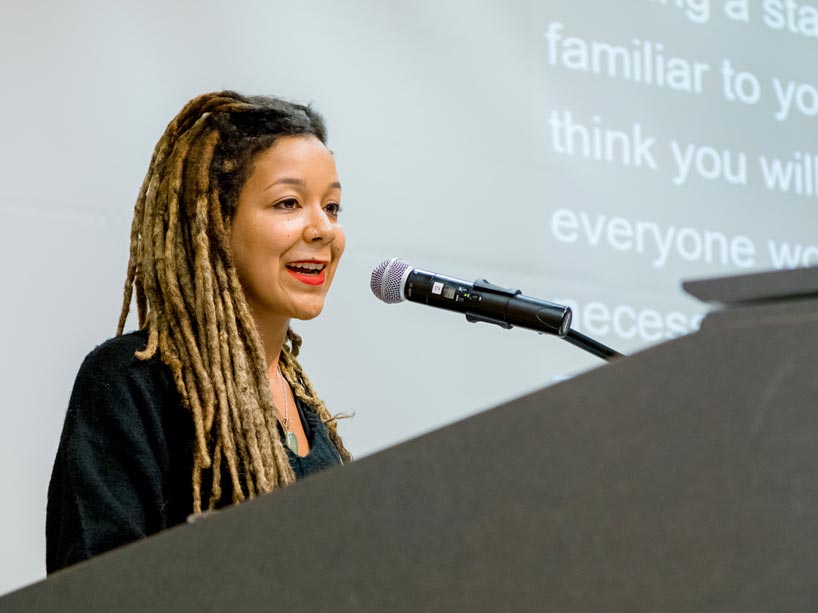Robyn Maynard discusses the power we have at Social Justice Week

Author and activist Robyn Maynard delivered the ECI Mandela Lecture at the 8th Ryerson Social Justice Week on October 24. Photo by Clifton Li.
In many ways, the 8th Ryerson Social Justice Week is anchored in a very different world than the one that spawned its introduction in 2011. In other ways, things are very much the same. On October 24 at RCC’s Eaton Lecture Hall, Canadian writer Robyn Maynard began this year’s standing room only ECI (Equity and Community Inclusion) Mandela Lecture by acknowledging that while racism is a harsh reality of our current society, it is wearing a thinner veil than the beginning of this decade.
Maynard, author of the bestselling book Policing Black Lives: State Violence in Canada from Slavery to the Present, titled her talk “Toward 21st Century Black Liberation.” Outlining the racism and sexism embedded in our history and institutions, Maynard emphasized that, at this point in history, Black liberation needs to be about much more than cosmetic changes to our political institutions.
Describing what she coined as a “whitelash” that has been felt in North America and Europe, Maynard referenced some of the accusations commonly shared by right-wing conservative thinkers: “That there is a threat to traditional values, to traditional demographics”.
“Globally, the right-leaning, the white-leaning, shift is alarming, but it’s not new. It follows the political logic of a crisis that is 500 years in the making,” said Maynard. She gave moving examples of how the kidnapping and enslavement of Africans; Indigenous genocide and settler colonialism; indentured labour of Chinese workers; and the internment of Japanese Americans and Canadians created an unearned and violently enforced white dominance.
“We’re seeing a response to the successes of our ancestors and those of us who are still fighting today. In some sense, what’s becoming clear is that powerful factions in our society are finally admitting publicly, admitting freely, that freedom and equality of countries like Canada and the United States was never intended to be for those who are racialized; to those who do not fit into the gender divide.”
Maynard discussed how racism is embedded in Canada’s public institutions, including its education system, social service agencies, and law enforcement, in a way distinct from the United States. “Canadians are trained to identify anti-Black racism as something that occurs in another place—the United States—or another time—the past.” She also drew similarities to the two countries, noting, “The un-funding of public services that we’re seeing today in Canada and the U.S. is part of an international policy that has been enacted on Black and Brown populations since they dared decolonize the places that they lived.”
Maynard touched on high incarceration rates and the epidemic of police killings of Black men, but added that even in law enforcement, there has been gendered hierarchy of outrage. She noted how Canada’s prostitution and vagrancy laws have disproportionately affected Black women, and how Black and Indigenous mothers have been subject to various forms of racialized surveillance, whether through what some call “welfare fraud” smears or “snitch lines.” Maynard challenged the audience to wonder openly about this gender and social discrepancy: “What would it look like for us to be as outraged by the intrusion of social services into Black women’s homes, and the unsubstantiated removal of their children, to be [seen as] at least as serious as the unwarranted arrest of driving, walking, and living while Black?”
Maynard made it clear that a 21st century understanding of liberation or “abolition” goes beyond simply electing one or two progressive politicians. She believes there is a need to invest in decent housing and community-building, instead of caging people or fatally shooting those who are marginalized. She added dryly, “We’re not asking for ‘proportionate’ death at the hands of police, or ‘proportionate’ incarceration. We’re not asking for a racially equitable distribution of state violence. What this struggle is about is ending state violence.”
Reflecting on the theme of this year’s Social Justice Week—“The Power We Have”—Maynard commented on provincial government policies and said that the power of the oppressed has instilled fear in the oppressors. “In order to fight for the preservation of the statuses, it is asking enormous sacrifices of those that are undergoing this fight,” she said. “We see suddenly the rollback of sick days [and] basic necessities like the $15 minimum wage. We see that people are literally sacrificing their own young rather than actually share any tiny piece of that power. … Supporting the literal scorching of the earth to support this status, I think, really represents to us the hollowness of what we are up against.”
Maynard left the audience with a hopeful note: “The power we have … has for a long time instilled a significant kind of fear, and I think it reminds us not to shy away from the kind of world that we are trying to build, that’s growing out of the struggles of those who came before us. We might not have freedom, but we’re freedom-oriented.”
The ECI Mandela Lecture was a collaboration between the Unifor National Chair in Social Justice and Democracy, the Continuing Education Students' Association of Ryerson and the Office of the Vice-President, Equity and Community Inclusion. The event was moderated by Yusra Khogali, co-founder of the Black Liberation Collective Canada (external link) , on a panel with Maynard and local activists Hawa Y. Mire and Syrus Marcus Ware, as well as featured performances by AmaiKuda et LesBois.